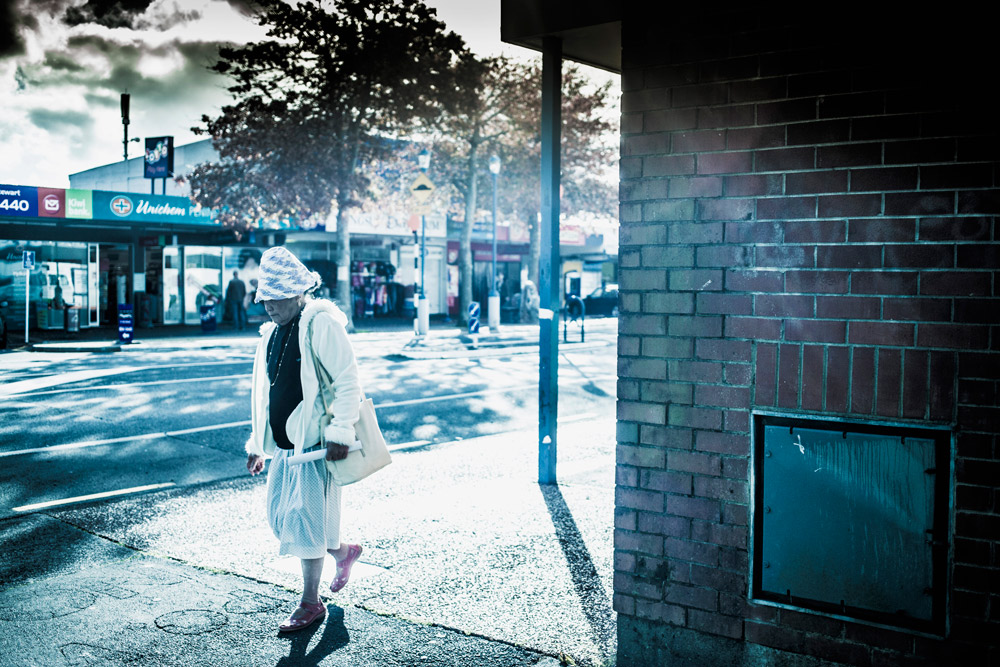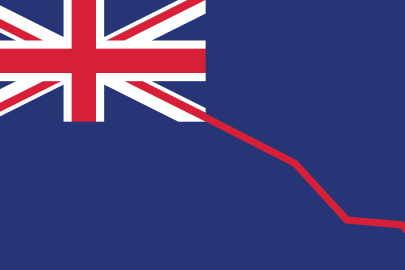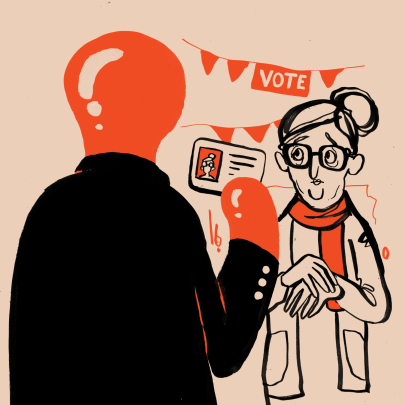Aug 12, 2014 Politics
Winning the election this September will be about winning the hearts and minds of west Auckland. That makes Te Atatu the new heartland. How will it vote? Steve Braunias goes door knocking.
Photos: Stephen Langdon
First published in Metro, June 2014.
For three days this month, I walked the flat earth of Te Atatu, that low, long peninsula in west Auckland lapped by the waters of two rivers and a harbour, and I door-knocked and approached innocent bystanders and stopped for tea, beer and a new pair of socks — I was a political correspondent, reporting from the street. I wanted to know how people will cast their vote in September. I was also getting to know my neighbourhood.
I moved in three years ago. I heart it. It’s got creeks and mangroves, sidewalk kowhai trees right now in delicate undress, a happy little primary school with a friendly, intimate roll of only 211, including my daughter. You get to Te Atatu via the State Highway 16 causeway above mudflats across the water from Pt Chevalier; it’s a kind of bridge, built in 1958, and it opened Te Atatu for development. The first families talk with misty sentiment of moving into Ronald Neil brick-and-tile homes built in a faraway time. They mean the 1960s.
It’s like an island. It’s the usual land of contrasts. There be the early settlers — workers, the bogan sons and daughters of workers, long-time Maori families who drifted from the East Coast, old-school Samoans. And now there are hipsters and media types, and wealthy migrants and wealthy old people in monstrous leaking homes with a lot of toilets and wonderful views of water.
It used to be known as Te Atatu North, or Tat North. The monosyllables tell you everything. No pretensions, probably no books, a proud, sporty community, with dogs howling night and day. It changed its name to Te Atatu Peninsula in the late 1990s. It sounded more desirable, more expensive. It was like a prophecy: house prices now start at a half-million, and don’t stop until well over a million. Te Atatu South used to look down on Tat North. But south has become north’s poor cousin, and real estate agents chorus that the peninsula is the new Pt Chevalier.
It’s not that desirable or expensive. The local college, Rutherford, performs miserably in academic rankings. The hipsters and the media types avoid the Te Atatu Tavern. The dogs continue to howl night and day. One neighbour who complained about the dogs across the road was sent a message. A word in te reo was painted in big capital letters on the tall corrugated-iron fence that faced his house. It read, POKOKOHUA. Neighbours scampered to their online dictionaries, eager to learn a new Maori word; most translations give it as, “Fuck you, arsehole.”
Woofy, watery Te Atatu. Half peninsula, half Tat North; half Labour, half National. For the past two elections, it voted in the Labour candidate, but the majority party vote went to National. Where to in September’s election? Electoral boundary changes have stripped Te Atatu of Massey and Glendene, and the electorate has gained Swanson, Ranui and Henderson. Going by the 2011 election results, it means Labour MP Phil Twyford’s majority would be halved, and National would also gain in the party vote.
But that’s based on paper. As political correspondent, I needed to hit the streets. What was the mood, what were the circumstances? I went to school. I went to the shops. I sat in a kitchen black with flies, and stared at a pretentious wine cellar. It was at once worse and wealthier than I figured, and I also thought: this is home.
On day one, in bright autumn sunshine, I walked my daughter past the bakery and the tattoo parlour to her school, kissed her goodbye, and set about finding Te Atatu’s pulse. I got off to a bad start. I couldn’t find a pulse: the first person I visited looked at death’s door.
He was of middle age and in his pyjamas. There were a lot of cats at his feet. He swayed at the door; the dark room behind him smelled of a lot of cats. He said he only voted when “something gets my goat”. The last time something got his goat, he voted Alliance. He couldn’t remember when.
Two nice old dears were walking to the doctor. Lesley Blick and Alwyn Kerr were both widows, both National voters. “But I quite admire Phil Twyford,” said Alwyn. “He’s always out there in his big red Labour van.”
I stopped a jogger, an attractive blonde running with her schnauzer. She was about to pack up and move to the US with her partner. “I’m an actor,” she said. I asked her if her partner acted, too. “Um… yes.” She said animal welfare was close to her heart, and would probably vote Green. I wrote down her name and she corrected the spelling. I looked it up later. Happy travels to Outrageous Fortune star Siobhan Marshall and the um… actor, Millen Baird.
I turned from the modest dwellings of Old Te Atatu Rd into Parkvale Grove, a weird, deathly housing estate in a cul-de-sac. Almost all the curtains were closed. It was a migrant territory of money trees on the front step and large chandeliers in stairwells. Saad Shammo, 57, was from Iraq: “I am in army 12 years. I am typing! Not kill anyone.”
His sons operate Haddad Takeaways on the main street. There were six cars in the driveway, and the house was an exhibition of red — red carpet, a red vinyl couch, red embroidered cushions. His red heart burst with love for New Zealand: “I come here, I kiss ground at airport. Is safe here. No ‘boom, boom’. I eat, I sleep. My family happy.” Would he vote? “What is vote?”
Sunny Chen, 37, will vote National. Anil Kumar, 63, will vote National. “But go visit the man two doors down,” he said. Why? “He used to be president of the Labour Party.”
And there he was, Mike Williams, at home with his painter wife, Judith, in a home built on feng shui principles by the estate’s traumatised developer, Mark Ja Jian — in 2008, his five-year-old daughter Xin Xin was kidnapped in front of their Albany home and held in a wardrobe for five days until released.
“I think we’re the only Pakeha family in the street,” said Mike.
“No, there’s one other,” said Judith.
“Oh, there’s one other? Where?”
She told him, and then she said, “The Asian neighbours are really good.”
Mike said, “There was an incident the other day. Judith’s friend arrived with a smashed-up car. He’d had a nose-to-tail. And a Chinese couple came over from across the street.”
Judith said, “No, it was a Korean family.”
Mike said, “Was it? Anyway, they came over to check we were okay.”
He thought Twyford was an excellent campaigner, always visible in his big red Labour van. What about the party vote? He said west Auckland, along with south Auckland, north Wellington and east Christchurch, would be crucial to September’s vote. “They’re where you’ve got a large block of non-voters. They hold the key to the coming election.” The nationwide turn-out in 2011 was the lowest on record, at 73.8 per cent; Te Atatu measured 72.4 per cent.
Back on Old Te Atatu Rd, Gail Tongs from Christians Against Poverty was working from a small office in the Te Atatu Baptist Church. Are their families struggling on the peninsula? “Absolutely. Absolutely.” She talked about the couple who had their power cut off when their family from the islands were visiting: “The mother was suicidal. The shame of it — she didn’t want the family to know they were in debt and struggling.”
There were other stories. Some were harrowing: a woman in a one-bedroom flat with her mentally ill son, with her other child on transgender reassignment. Some were vaguely hopeful: budgeting advice helped ease the financial burdens of a man with anxiety and depression who feeds himself on $50 a week.
What did he make of Labour? “I’ve never really been a fan of homosexuals.”
Gail voted National last time. “I think leadership is really important for a nation. John Key leads. But I’m completely uncertain how I’m going to vote this time, simply because I see people doing it really, really hard. At the same time I do understand and believe in the benefits of good business. It’s getting that balance right.”
Two doors down, plumber Darren Turnwald, 47, also talked business. “I support working-class people. I support business. Without business, you don’t have jobs.” He votes National. What did he make of Labour? “I’ve never really been a fan of homosexuals.” What? “Well, Chris Carter,” he said, naming the gay politician who was Labour’s former MP for Te Atatu. “I can tolerate it. But I don’t like them being blatant about it. I don’t show my sexual orientation in public.”
He’s a good plumber. He has three dogs. They howled when I arrived. “Knock it off,” Darren yelled. He stood in front of the house where he grew up. His parents bought it in 1972. Opposite used to be farmland. He remembered horses galloping along the road at night-time: “The sound of hooves was quite common.”
Nick Wilkinson, 38, a cook at the Piha RSA, smoked rolled tobacco on his front porch. He wore black. He was laidback, immediately likeable. He said, “I’ve always been a westie. My mum was a westie. Led Zep, Floyd, Stevie Nicks — oh my God. I can listen to that all day.”
Te Atatu, he said, was safe. “But we have a 15-year-old who hangs out in Henderson. Henderson’s a shithole. It’s where all the bums hang out. They stand over her for her clothes — a $500 Kathmandu jacket! Phones, numerous times. It’s not a safe place, it’s just not. I’m disgusted by how many parents don’t give a crap. I talk to those kids. ‘When did you last eat?’ ‘Oh, a couple days ago.’ ‘Last see mum?’ ‘Dunno.’ Disgusting. Absolutely disgusting. Bumming cigarettes, change — don’t let your kid hang out there when she’s older.”
We talked politics, briefly. He thought he might have voted National last time. Nick didn’t put much faith in government. “Me and my partner, we work our arses off and we’re a good, law-abiding family and we’re struggling, mate. So seeing those little pricks in Henderson take our daughter’s phone and jacket…”
But there was a great kid around the corner, at Al’s Mechanical Repairs. Apprentice mechanic Dan Netto, 17, said with pride: “I just finished a cam belt.”
His ambition was to own his own garage. “Like I already owned my own car-grooming business.” He chose a spot behind Westpac on the main street. “I had a passion for cleaning cars. I always like to see a clean car. I did inside and out, wax polish, vacuum. I didn’t think it would kick off that fast but I was doing two a day for $40 a pop.”
Did he take an interest in politics? “John Key and Labour and that? Nah.”
The day ended with the despair of a Samoan woman who didn’t want her name used. She was sitting on her front step, depressed. She’d rented the house for 10 years but the landlord was selling it. “They give me 90 days. I got no choice. It’s very not good. It’s not good at all.”
She works the night shift at the Warehouse in Lincoln, and is a solo mother. “He’s a good boy and I’m so proud to be his mother. He didn’t miss a single day of school in two years.”
Henare is a personable fellow. But there was almost a kind of depression about him, a heaviness of spirit.
I asked her about politics. “I been voting National,” she said. “But I might change my vote. I might do. Honestly, I might do. Because of selling the assets, and all these rich migrants who buy everything. I’m a migrant myself. We built up this country, but we’re the ones with less money and less help. My grandfather was the first Samoan to own a car. That’s what I heard.”
I walked past her house two days later. It had an OPEN HOME sign in front of it.
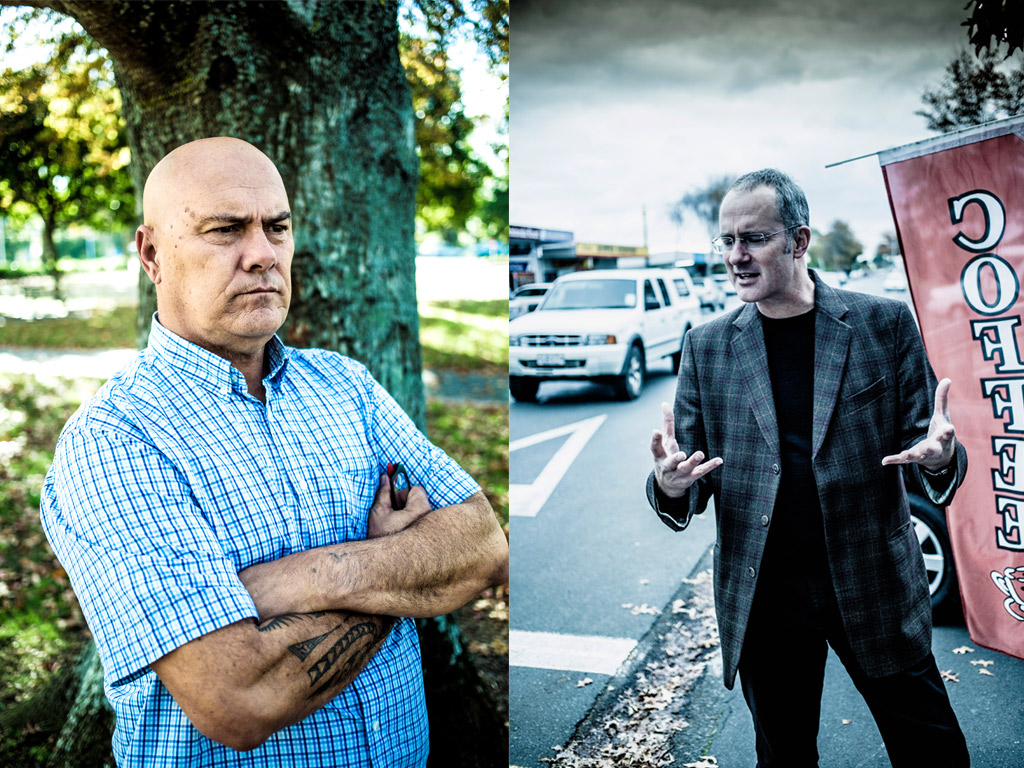
In between my island tramps, I met the retiring and incumbent MPs. Tau Henare has lived at 11 Tawa Rd for 30 years — his mother-in-law is at number 13 and his sister-in-law at number 15 — but we met at the RSA. Feature attractions included an 8mm Mauser rifle made in Berlin, a Hot Nutz dispenser, and a sad memorial to Whelan Hazard, killed in action over Germany in 1944: “The only resident of Te Atatu who left for the 2nd World War and did not return.”
Henare is a personable fellow. But there was almost a kind of depression about him, a heaviness of spirit. He’s standing down from politics, after contesting Te Atatu for the past three elections. He takes credit for improving National’s party vote, but said: “They didn’t like the candidate.” He laughed. He stopped laughing. “I don’t take it personal.”
Many locals want a ferry service. Henare: “I think it’s silly.” I was thinking about my interview with Gail Tongs from Christians Against Poverty when I asked him if there was any poverty in Te Atatu. He said, “No.”
He speculated that school principal Mark Bridges, the brother of Energy Minister Simon Bridges, might be chosen as National’s candidate. He thought National desperately needed to throw more resources at winning votes across west Auckland, and criticised the party’s commitment. “We’ve left it to people like Paula [Bennett] to do the heavy lifting.”
He was also critical of National’s recent blunders involving MPs Maurice Williamson and Judith Collins. “Childhood fucken mistakes,” he said. “Ringing up the cops. Why the fuck would you do that? Maurice has been around. He should know better. Judith Collins — she was wrong in the way she handled it, the way she put the PM under pressure. That is a no-no.”
I visited Phil Twyford on a Sunday at his home on 115 Beach Rd. There was his big red Labour van, and there were the weeds in the front yard. We sat in the back yard, among swan plants and roses, and chickens clucked beneath peach trees.
Twyford is a gentle, pleasant individual. He moved to Te Atatu in 2010. He said he loved it, and welcomed the mix of new migrants and old families. His neighbours are Chinese; during our interview, a man next door cleared his throat as loudly as water sucked down a bath, and spat so hard he groaned. Twyford warbled on.
He talked a lot about sorting out Te Atatu’s hopeless public transport system — there is one bus an hour, which often runs 40 minutes late. “We need a modern, full-on rapid transport system right down this corridor. The motorway can barely cope now and putting one extra lane on each side will fill up in no time.”
He backs the ferry proposal, and talked about poverty on the peninsula: “Families are really struggling. Living in garages is not uncommon here.”
I asked how he viewed Henare as an opponent, and he said, “Tau’s disadvantage was after being the candidate for a few elections here, the local community got to know him quite well.” He speculated that Alfred Ngaro, already in Parliament as a list MP, might be chosen as National’s candidate.
He went through the boundary changes. “I’ve lost Massey to Upper Harbour, and Glendene to Kelston. They are definitely good Labour areas. I’ve gained Swanson, Ranui, Henderson Heights. It’s a mix; Swanson is about as National as Massey was Labour, Ranui is solid Labour, and the Heights leans National.
“But all of west Auckland is a really important focus for us. We’re making sure we’re talking to our voters across the west, and not just running little independent electorate campaigns. We’ll be campaigning hard for the party vote and in fact we already are. We’ve got a couple of phone banks running, doing three shifts a week, and I’ve been doing street-corner meetings in Swanson for the past three months. I’ve got one today, actually.”
He got into his big red Labour van. I waved to the man next door. He didn’t wave back. You could say he looked phlegmatic.
Day two began with Tukairoa Edmonds, 75, who lives on my street. He wore a Lion Red T-shirt and talked about his working life as a shearer, a farmer, a drain digger. He pointed to a tree on his property and said, “D’you know what that is?” I said I didn’t. “A kauri, mate. A bloody kauri, in Te Atatu, eh?” He’ll vote for the Maori Party.
Brian Southey, 81, was in the front sunroom of his home. He and his wife, Gay, have lived there for 56 years in a Ronald Neil home: “He kind of built Te Atatu.” Brian has heart problems, and lifted a slightly trembling hand as evidence of Parkinson’s. He’d worked as an industrial mechanic: “I’ve made grinding wheels. I’ve done quite a lot in my life, I reckon.” Brian and Gay vote Labour.
Ana Kani, 34, from Tuvalu, had just moved to Te Atatu from Massey. What was it like there? “Oh, it’s horrible! People are running around and shouting. I heard a neighbour scream.” She’ll vote Labour: “They on our side. National, they only looking after businessman.”
On and on in the sedate peninsula, safer than screaming Massey. Fay Cobbett, 34, was out with her daughter in a pushchair. A tui blathered on in the top branch of a Norfolk pine while we talked. She and her husband run their own business, a robotics company. “There’s lots of little internet start-ups on the peninsula. Have you heard that its nickname is Silicon Valley?” She hadn’t decided, but will probably vote for the Greens.
I visited Dr Tony Wong, the local dentist. I’d not interviewed anyone before while they wore a facemask and held an elderly woman’s dentures in the palm of their hand. He’ll vote National. “I know Melissa Lee,” he said.
His receptionist, who wore pink nails and a lot of rings and bracelets, said she used to manage Ladies First on the main street. “Underwear,” she said. Quality underwear? “It was in keeping with the times and the people who were here. It wasn’t the highest standard but it was lovely.” She said she’d vote National, always had. But she talked with huge enthusiasm about a ferry service in Te Atatu and said, “If Phil Twyford got it going, I’d vote for him. I would! Yes, yes. I really would.”
Dr Wong walked past again, still holding someone’s gums. If only they could talk.
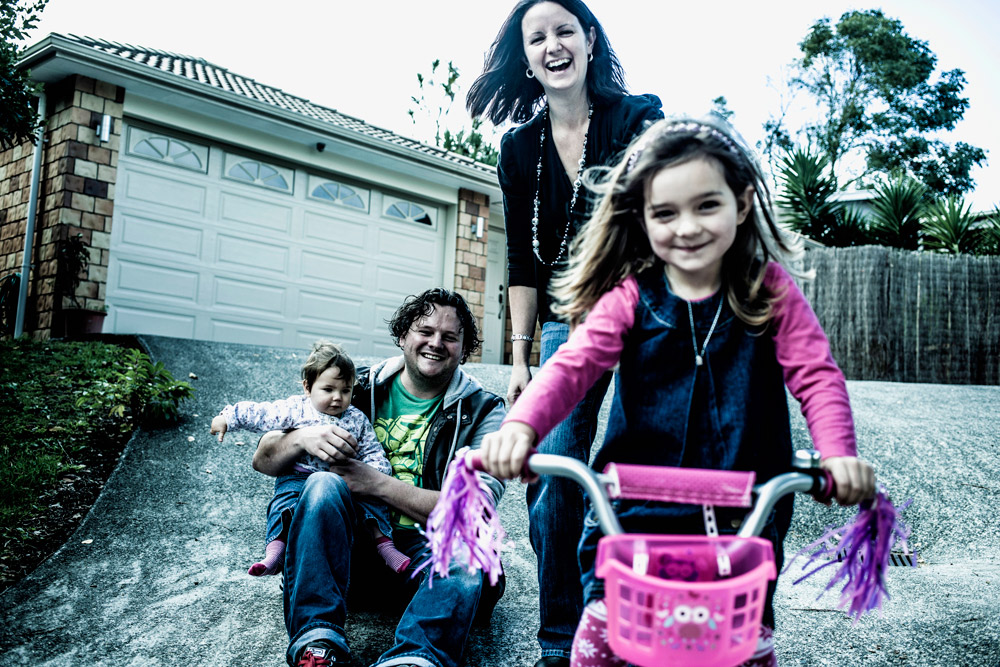
When I interviewed Mike Williams, he mentioned he’d read in Metro that I once named Te Atatu Menswear the best clothes shop in Auckland, and said: “Look at me. I’m wearing their clothes from head to foot.” So was I. We were like shop dummies. But I needed new socks, so I called in on the store, run by Mal and Wilma Buscomb. Mal’s father, Red, opened the shop in 1962.
“We have a loyal clientele,” said Mal. “Most of our business is repeat customers.” Two ticks, National.
Mal undoubtedly knew Walt Wymer, 80, who has lived in Te Atatu for 56 years, in a Ronald Neil home. Lanky, fit, in shorts and sandshoes, he was outside the tennis club with his wife, Lesley.
“Membership is rock bottom,” he said. “In the 1970s, it had hundreds of juniors. Now you’re scratching to get a dozen. Go past on a Sunday and you won’t see a soul. We’ve got all these new people, but they don’t join clubs, they don’t shop here, they don’t care. I’ll see them dump their lawn clippings into the mangroves when they think no one’s looking.”
Last election, he voted for New Zealand First. “I’m a Peters man.” But he’d previously voted Labour, and might go back. “I was watching Caygill on TV the other night.” Who? “Caygill. Is that how you pronounce his name?” Lesley worked out that he meant David Cunliffe, who was on Campbell Live, cooking dinner for John Campbell. “Cunliffe, yes. I thought him and his wife came across pretty well. He’s a good cook. And I didn’t know his dad was a minister. He’s all right, I think.”
Hipsters glug espresso slop at Servo’s, Luscious or Fuse. I prefer the tearoom with its incredible name above the door: FOOD’S COFFEE HOUSE. I ordered some food’s and got talking to pensioners Wayne and Lyne at the next table. Wayne wore a kind of cowboy hat. Lyne said she went blind when she was 23. Wayne tenderly brushed some crumbs off her lap, and tucked into a steak-and-mushroom pie.
“It’s a treat coming here,” he said. “We struggle from one pension day to the next. You know what I was? A mortgage broker. I spent a million dollars in a year once.” His peak years were 1997-98. “I earned $120k in one week! But I retired too young. I didn’t put enough away.”
He thought he’d vote National. He doubted Cunliffe could lead. “But you look at Key’s face. He’s aged at least 10 years in the last four.”
It was his birthday the following Thursday. Any plans? Probably come back to FOOD’S and have another steak-and-mushroom pie. “Beautiful,” he said, savouring its dark goodness. “Beautiful.”
I needed a drink. I went to the tavern. I talked to a Maori woman, 67, who drank a Woodstock; Labour, two ticks. She talked about working behind the bar in the late 1990s, and named a local Samoan family who were always fighting. Craig White, 43, was at the bar having a beer with his dad, and said he knew that family. “I went to school with the roughest of the lot, but he’d always say to my mum, ‘Hello, Mrs White.’ If he knew you, you were fine.”
The light shone on his shaved head. He was in the cleaning industry, and abhorred Labour’s pledge to raise the minimum wage. His firm couldn’t afford it. A vote for National was a vote to prevent a Labour government. “It’s a little bit selfish,” he said, “but that’s how you vote, isn’t it?”
And on the third day it rained. I didn’t mind. I took shelter at FOOD’S, and under macrocarpa trees on the shoreline, where boats swayed in a high tide. Everywhere, views of the harbour bridge and Rangitoto; there were fernbirds in the reeds, rosellas in gum trees. In town, I made inquiries about the abandoned service station on the main street. For the past two years, there’s been much worried gossip that a gang had moved in and intended to turn it into a fightclub.
There was much worried gossip that a gang had moved in and intended to turn it into a fightclub.
But Dave Palmer at Barfoot & Thompson said the owners are a Malaysian family, who sold it in March. The deal has yet to be signed off, but it’s expected to go ahead as a mix of retail and commercial. “I was told by locals not to go out there by myself. They said the tenant has gang connections. But I’m 6’5”, so it didn’t worry me.” He left his business card, but the tenant didn’t reply. His lease runs out in December.
I toured the ghastly McMansions at the Harbourview development, and doorknocked a householder who declined to give his name. He said he was on National’s selection committee for Te Atatu. He confirmed that Mark Bridges and Alfred Ngaro are being considered to replace Henare, and added the name of local body politician Peter Chan. “I think it’s winnable for National,” he said. “Tau polarised people.”
Hokimate Williams, 79, lived in a cul-de-sac. She wore a mustard-coloured jersey, and said, “I been here since 1963. I got nothing to say about the peninsula. No such thing. Tat North, that’s where I live.” Labour, two ticks.
A neighbour brought over a bag of apples that a relative had sent from Hastings. She said to visit her husband. I popped next door, and Haare Tukariri, 75, put on a pot of tea. Maori Party, two ticks. He was a very gracious man, thoughtful and specific. “Let me tell you about this street,” he said. “This side, Maori, Dutch, Niuean, Maori. Other side, Samoan, Japanese, and a half-way house.”
He’s lived in Te Atatu for more than 40 years. “It’s a very prejudicial place. It’s discriminatory. If you can live with it — hey, what a hell of a place to live! If you can’t, you stay in your house.” He was talking about the long battle to build a marae in Te Atatu. “I started on this project when I was 37,” he said. “The dream never dies.”
The dream might be getting closer. In 2005, after years of objections from the Te Atatu business association, council finally gave consent to build a $16 million marae, on beautiful waterfront reserve property. But there was a second round of objections — from the descendants of the original owners of the Te Atatu reserve, who took legal action to get the land, or at least the value of the land, returned to them. Their families had sold it to the Auckland Harbour Board in the 1950s, when there were plans to build a major port. The plans went nowhere, and the descendants argued the harbour board had an obligation to return the land or offer compensation. Auckland Council, as owners of the reserve, were taken to court. The marae was put on hold.
It was New Zealand’s biggest land claim outside of the Waitangi Tribunal. The families who led the challenge were from original Te Atatu stock, before the 1960s boom — 19th- century pioneers such as Charlie Williams the coach-builder, and the McCormicks from Scotland. Dave McCormick is the only surviving member of his family. He owns the peninsula’s most incredible home: there are six old boats moored in a wild sea of long grass at the front of his section, and his house looks like a shipwreck.
The dispute remained locked for nine years — but a decision was finally reached on April 14, when High Court judge Justice John Fogarty ruled against the families. Nothing stands in the way of the marae unless Te Atatu finds another way to stop it.
My last stop was at the home of a Milanese banker who likes to dress up in military outfits worn by New Zealand troops in World War I. Maurizio Piglia, 57, said, “I’m one of those strange people who try to do finance without being predatory.” I asked if he was left-wing. He said, “Rather.”
His latest venture was to buy O’Sarracino restaurant in Mt Eden — with his neighbour across the road, former Alliance Cabinet minister Laila Harré. As partners, they’re among New Zealand’s first living wage employers, paying all their employees and contractors at least $18.40 an hour.
Rain topped up his beautiful swimming pool. He put on a pot of coffee. Maurizio voted Green last election, but is returning to Labour. “I like Matt McCarten very much,” he said, referring to Labour’s campaign manager. “I meet him at Laila’s house. We have toast and wine. He’s there to make Labour a little more like Labour used to be.” And then he took me downstairs, brought out a beautiful Australian World War II rifle he keeps under lock and key, and stroked a rack of military uniforms. “Re-enactment,” he said, “is my hobby.”
He put away the gun. It stopped raining. I tramped the scenic walk, around the shoreline, and by the creek. In town, Twyford’s van was parked outside the barber shop, and I went into FOOD’S to study my results. Every customer is given a little bowl of free fruit. I scoffed grapes and counted 15 votes for National, nine for Labour, two for the Greens, two for the Maori Party, six undecided. New peninsula and old Tat North, together at last — in harmony, tangled up for blue.

